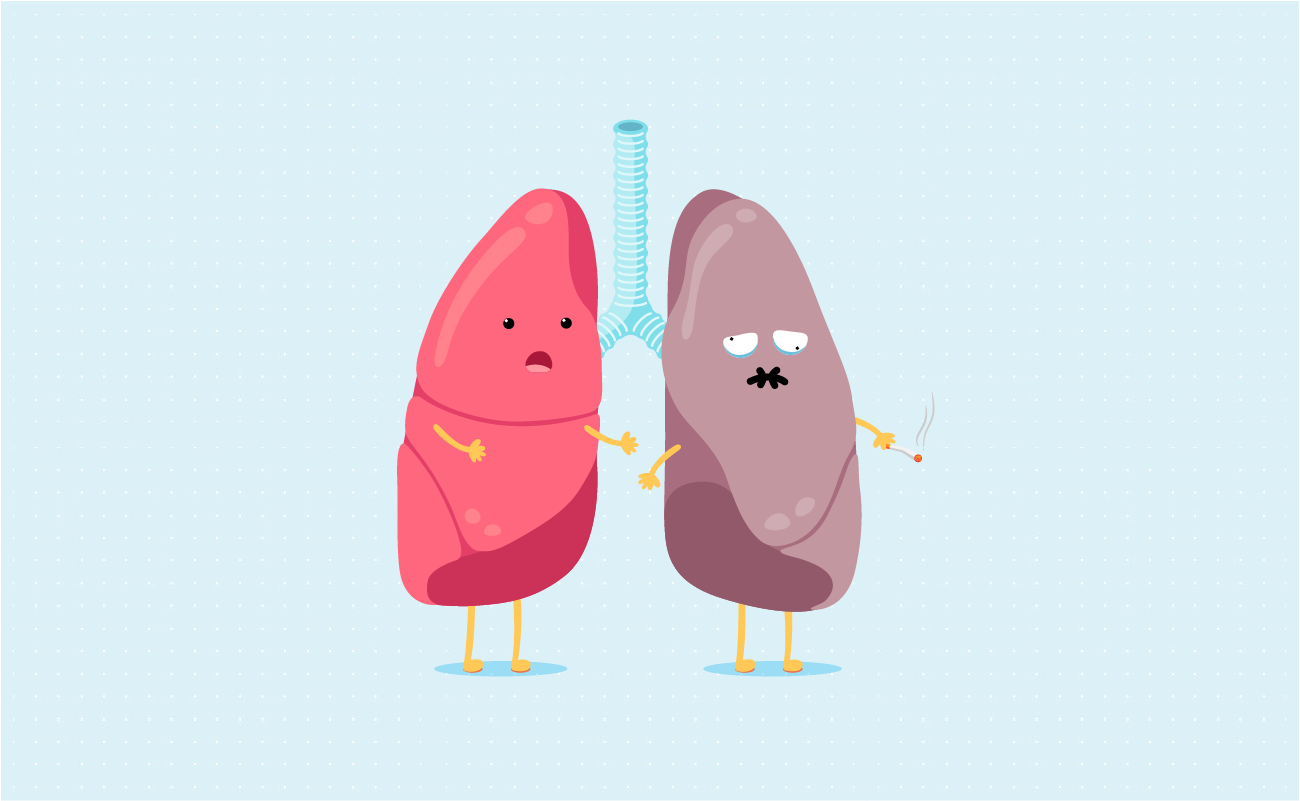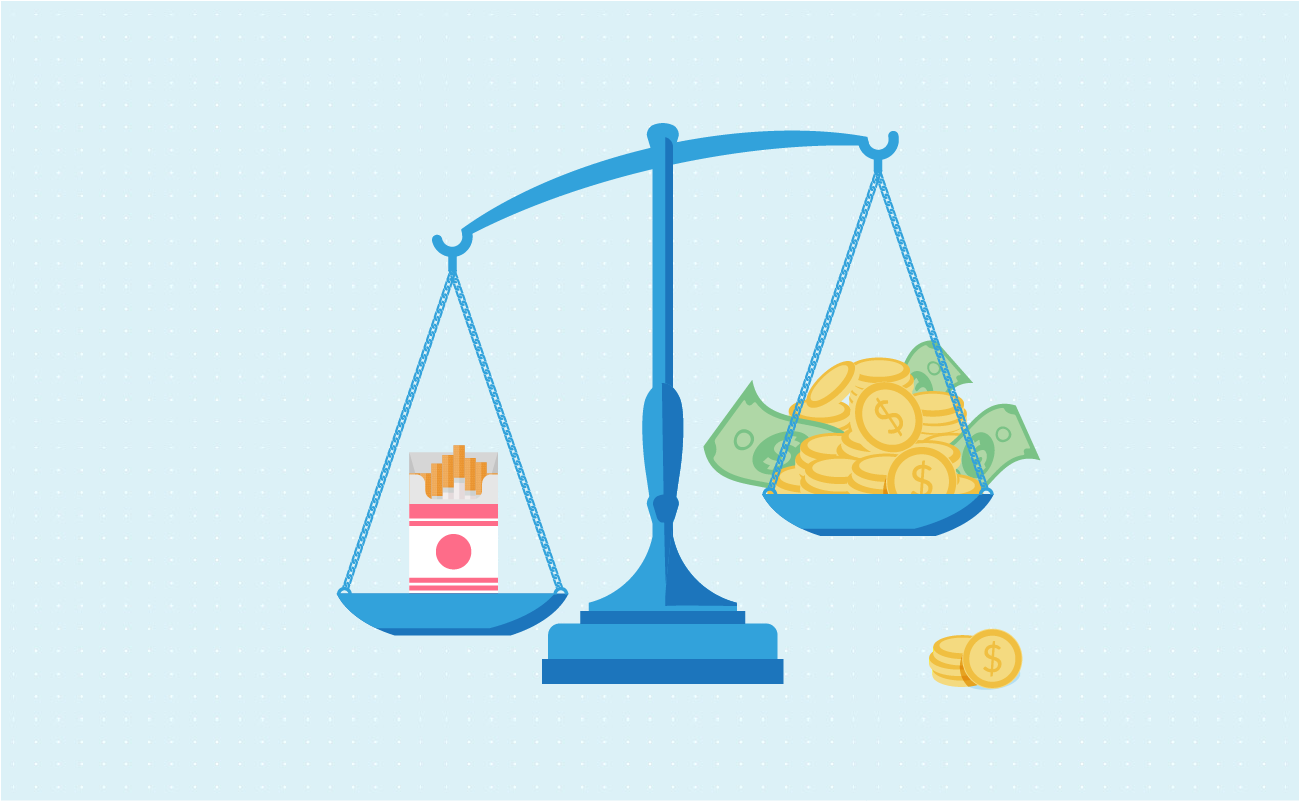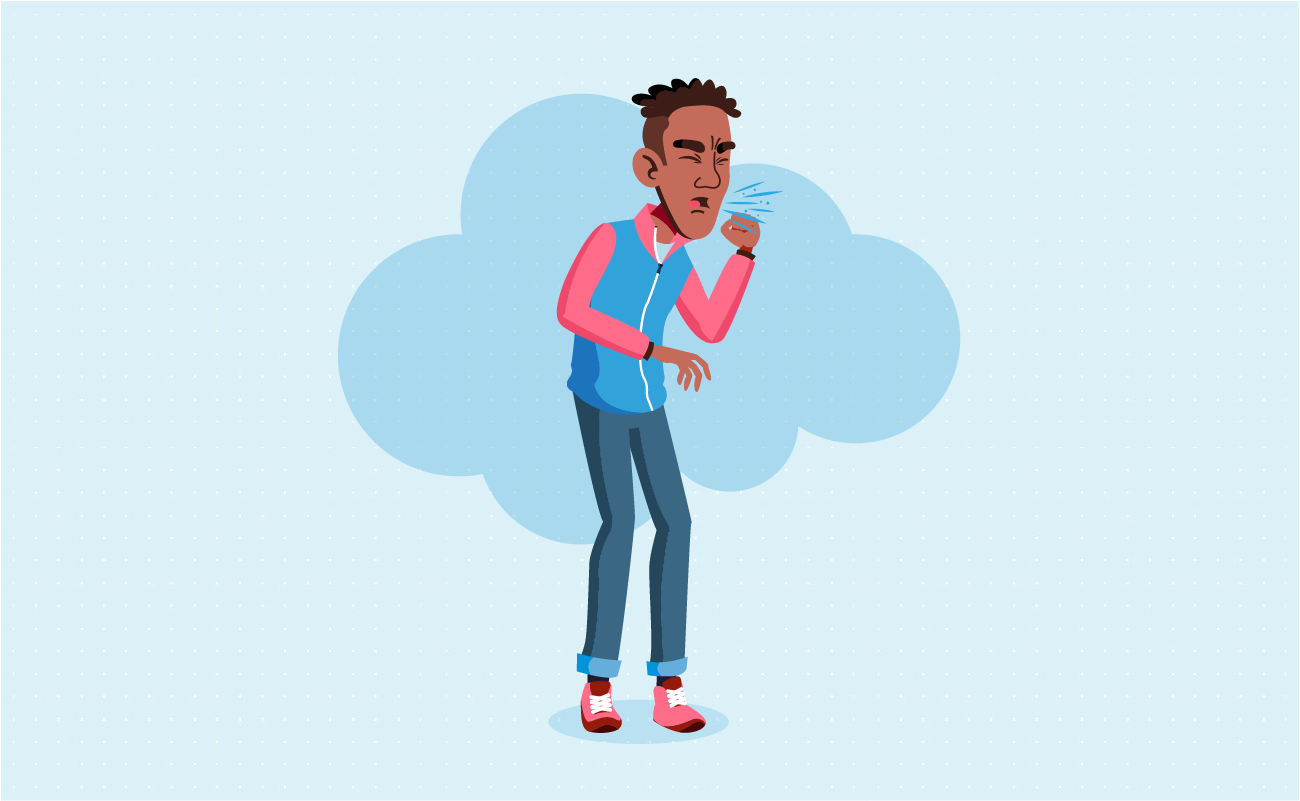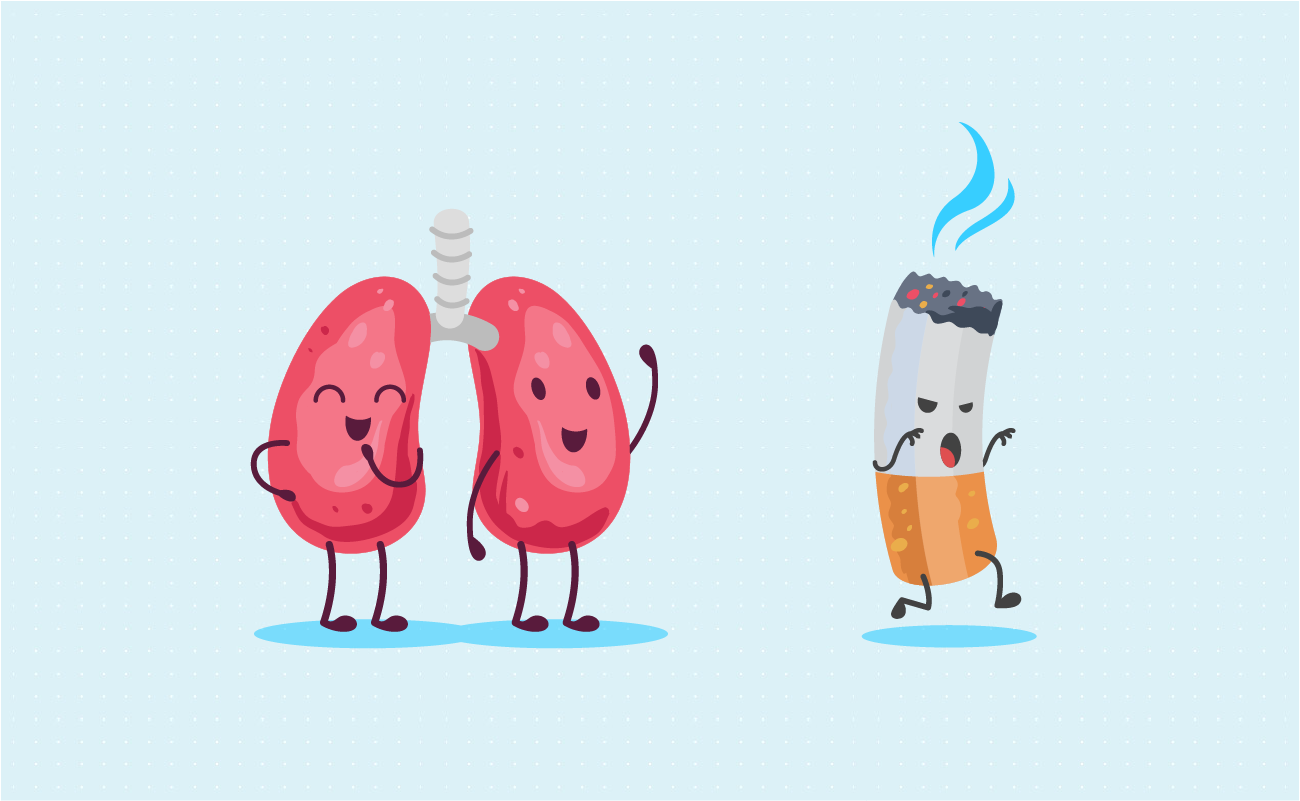 Quit Smoking Cigarettes Savings Calculator
Quit Smoking Cigarettes Savings CalculatorUse this calculator to estimate how much money you'll save if you quit smoking. This calculator also estimates how much interest will be earned if those savings are invested.
Guide published by Jose Abuyuan on February 3, 2020

When you're a smoker, you've probably heard ad nauseam how bad smoking is for you. Doctors, your family members, Star Wars, and former smokers chimed in once or twice with the same message. And this website is no exception.
Cigarettes aren't called “death sticks” for nothing. Tobacco products contain poisonous chemicals that contribute to cancer and other diseases. According to the World Health Organization, tobacco is the only legal drug that kills most of its users when used as directed. Today, cigarette smoking is a leading cause of preventable death around the world. Smoking-related deaths claim seven million lives each year.
As if that isn't enough, smoking also costs you a pretty penny over the course of your lifetime. The consequences to your health are expensive, in more ways than one. You are setting your money alight to feed a deadly addiction. Snuffing out this habit makes excellent financial sense.
Many cigarette ads portray glamorous and pretty people enjoying the good life. These are often set in such lavish settings like faraway islands and boat rides. In the past, the long cigarette holder and the cigar pipes have been symbols of affluence. And in a sense, these images are right. Tobacco is a luxury item you do not need.

Today, the average box of cigarettes cost $6.28 in the United States. Federal and state excise taxes make up a significant portion of the costs. Across the country, local taxes can increase the costs by a considerable margin. Cigarettes in New York, for instance, can cost more than $10.67 a pack, while they could cost $4.62 a pack in Missouri. Consider that many smokers can consume a pack a day; this amount will add up over time.
| Frequency | Cost |
|---|---|
| Daily | $6.28 |
| Weekly | $43.96 |
| Monthly | $175.84 |
| Yearly | $2,292.20 |
If you are a chain smoker, you'd consume even more packs in a day. The money you save by cutting out this habit is phenomenal, and this is only the tip of the iceberg. The costs of smoking do not stop at the price of cigarettes.
The price of treatment for tobacco-related diseases is steep. The U.S. spends more than $170 billion on healthcare due to smoking-related illnesses.
Lung cancer is the biggest of the killers associated with tobacco. As the leading cause of cancer deaths in America, lung cancer is a tall order even for those who go into remission. One study on Medicare patients found that the monthly costs of chemotherapy and radiation therapy for lung cancer can rise up to $8,287.00 in its early phases. That amounts to $49,722.00 within the first six months alone! Surgical interventions are also steep, at around $30,096.00 in 2017.
Chronic obstructive pulmonary disease (COPD) can also beat on your budget. This family of diseases, which includes emphysema, can leave you literally breathless. Another study reveals that much of the expenses from this family of illnesses come from hospitalization. At its most life-threatening, COPD could lead to $10,812.00 in treatment costs. Of this, 63 percent is dedicated to hospital care alone.
And we're still talking about the lungs. Your costs can ramp up as you factor in heart disease and other cancers.

In the past, tobacco products were a readily available item. Cheap cigarettes were available to anyone who could afford them. Over the years, legislative restrictions and new taxes have increased the price of tobacco products. This was in response to the discoveries linking tobacco smoke to poor health.
Tobacco's innate chemistry, however, isn't the only thing that makes it addictive. Companies still make a princely sum from the sale of tobacco products. Despite a decline in smokers, the tobacco industry continues to boom. The industry made about $18 billion in 2016 alone.
The United States remains an attractive market for international tobacco conglomerates. Advertising restrictions to smoking are not as heavily regulated. American cigarettes have the freedom to make creative packaging. Whereas British packs would be plain, American cigarettes would have attractive packaging. American regulations also impose less intrusive warnings in tobacco packs compared to European countries.
U.S. tobacco firms have taken advantage of this. They spend around $9.36 billion to market cigarettes in 2017. Of this money, $6.19 billion was used to incentivize retailers, lowering the cost of cigarettes to consumers.
The Centers for Disease Control and Prevention estimates that more than 258 billion cigarettes were sold in 2016 alone. While cigarette consumption declined by 3.5 percent the following year, the same cannot be said for other tobacco products. Cigar sales grew by 29 percent between 2012 and 2016. The sale of smokeless tobacco in 2015, meanwhile, peaked at about 129.36 million pounds.
Smoking-related illnesses cost the economy more than $300 billion a year. Although the majority of which goes to healthcare, another $156 billion is lost to a decline in productivity. By scale, large companies take the biggest hits by the health effects of smoking. Even smaller businesses can feel the crunch when their employees fall ill because of smoking. Companies can save up to $6,000 for every employee that quits smoking.
Moreover, smoking within the workplace premises affects the health of all employees. Many of the health issues related to smoking are also associated with second-hand smoke. Other employees may be sensitive or allergic to tobacco smoke. These can cause an immediate decline in productivity. For this reason, the smoke-filled offices seen in the series Mad Men are a thing of the past.
Companies have seen the benefits of helping employees quit. The emotional toll of losing a beloved member of the team can be all the incentive a company needs to implement a quitting program. These often use a series of surcharges or incentives to encourage employees to quit smoking. Many of these companies also offer programs to help employees kick the habit.
Taxes on tobacco products remain lower in the U.S. than elsewhere in the developed world. Excise taxes—both state and federal—account for about 44 percent of the average price of a cigarette. This is a paltry sum compared to the 82 percent rate in the United Kingdom. Nonetheless, these taxes play a crucial role in stemming demand.
Research has found that a 10 percent price increase is enough to reduce overall cigarette consumption by up to five percent. Most of the reduction has been seen among teenagers and younger adults. These groups are three times more likely to respond to price changes than older adults.

Smoking cessation is not an easy undertaking. It's an uphill battle and there's a high chance that you'll fail the first few times. In the end, it's all worth it. The efforts you make pay off big time, and not just in dollars and cents.
The losses you avoid from kicking the habit is often all the financial incentive you need to quit. The $6.28 or so you spend on each carton of cigarettes can lead to diseases that cost tens of thousands in healthcare bills. In the process, you would place the people you love in a stressful situation. The only fortunate outcome of that ordeal is if you survive, and that is not guaranteed.
If you add the numbers, dropping one pack of cigarettes a day can save you more than $2,200 a year. You can use that money for a lot of other things.
The cost of smoking weighs heavily when you are poor. The money that went up in smoke could've gone to helping you build a better life for you and your family. For people in low income brackets, $2000 is close to the amount they would need to start a secure emergency fund. If you're just starting out, you've taken the first step toward financial security by saving the money gained from not smoking.
As the chart above mentioned, a daily pack of cigarettes at $6.28 becomes $2,292.20 in a year. Once you quit smoking, this money adds up. In ten years, that translates to $22,922.00 in savings (and healthier lungs). Suppose you saved this money and put it to work on your investments.
Assuming an initial interest rate of 1.5 percent, you can make a lot of money within that time:
| Year | Savings | Interest | Balance |
|---|---|---|---|
| 1 | $2,292.20 | $16.57 | $2,308.77 |
| 2 | $2,292.20 | $53.08 | $4,654.04 |
| 3 | $2,292.20 | $90.16 | $7,036.41 |
| 4 | $2,292.20 | $127.84 | $9,456.44 |
| 5 | $2,292.20 | $166.11 | $11,914.75 |
| 6 | $2,292.20 | $204.98 | $14,411.93 |
| 7 | $2,292.20 | $244.47 | $16,948.60 |
| 8 | $2,292.20 | $284.58 | $19,525.38 |
| 9 | $2,292.20 | $325.33 | $22,142.91 |
| 10 | $2,292.20 | $366.72 | $24,801.83 |
In this period, you would've earned a total of $1,791.80 in interest. And to think you would've just set that money alight. To find out how much you can save when you quit smoking, use our calculator above.
The most important part of breaking the tobacco habit is to stop putting smoke in your lungs. The biggest health hazards are suspended within tobacco smoke itself:
Reducing the amount of smoke has immediate health benefits. Highly addictive nicotine, however, is another matter. Nicotine deprivation leads to withdrawal symptoms that are near-impossible to endure.
The most efficient attempts to quit smoking involve therapy and pharmacological interventions together. This can seem like a costly proposition, but also one that pays off well. Pharmacologic quitting aids seem expensive at first because they are bought in bulk. Their high initial cost is thus much lower when time is factored in.
A pack of generic nicotine patches cost about $38, and contain enough patches to supply you for two weeks. Non-nicotine medications like bupropion can also be used. This costs about $18 for a pack of 100, though prices vary.
| Frequency | Cigarette Pack | Nicotine Patch | Bupropion |
|---|---|---|---|
| Daily | $6.28 | $2.71 | $0.18 |
| Weekly | $43.96 | $19.00 | $1.26 |
| Monthly | $175.84 | $76.00 | $5.04 |
| Bi-annually | $1,146.10 | $989.15 | $32.85 |
| Yearly | $2,292.20 | – | $65.70 |
Years in tables are defined as a full 365-day period. Months are defined as a period of four weeks (28 days).
The chart does not track the yearly cost of nicotine replacement. This is because you will need to slowly wean yourself away from nicotine replacement to break your addiction forever. Vaping, popularly marketed as a quitting aid, does a poor job of eliminating nicotine dependence. This and its other health risks make vaping a poor substitute for other quitting aids.
Besides the money you save on tobacco products, quitting also generates other financial benefits. Insurance companies, for instance, see smokers as a risky proposition. If you succeed, quitting could reduce your overall risk profile. Many insurance companies encourage people to quit smoking, though it could take about a year for it to reflect on your premiums.
Medical scientists have found that healthy lung cells can be found in the lungs of a former heavy smoker. This exciting discovery proves that it is never too late to quit.
The biggest prize of quitting tobacco is your health. You can see a sharp improvement in your general well-being once you quit. These compound as your body recovers. Some of these are more instantaneous than others. First off, you will eventually see a decrease in the amount of times you cough within a matter of days after quitting.
Over time, you reduce your chances of emphysema and other lung diseases. Eventually, you also slash your risks of succumbing to cancer and heart disease. As you recover from years of smoking, you gain back your prior life expectancy. This is time you could be spending fulfilling your life goals with the people who matter. It's something you can never put a price tag on.
Jose Abuyuan is a web content writer, fictionist, and digital artist hailing from Las Piñas City. He is a graduate of Communication and Media Studies at San Beda College Alabang, who took his internship in the weekly news magazine the Philippines Graphic. He has authored works professionally for over a decade.